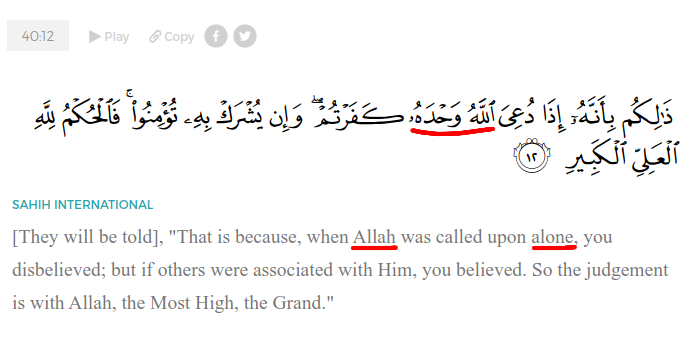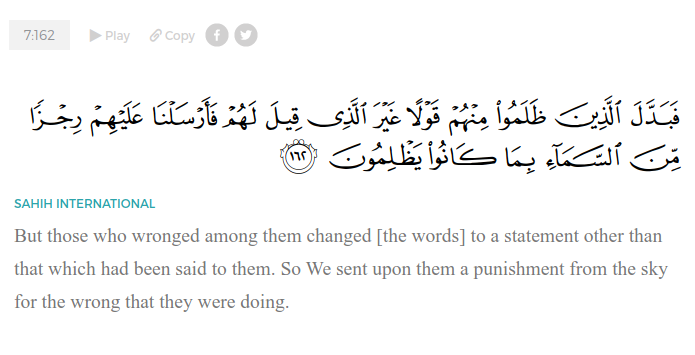The Qur'an tells us in a specific verse to use the Qur'an alone.
17:46 - We place shields around their minds, to prevent them from understanding it, and deafness in their ears. And when you preach your Lord, using the Qur'an alone, they run away in aversion.
17:46 - We place shields around their minds, to prevent them from understanding it, and deafness in their ears. And when you preach your Lord, using the Qur'an alone, they run away in aversion.

Traditional Translation
17:46 - And We have placed coverings on their hearts and a heaviness in their ears lest they understand it, and when you mention your Lord alone in the Qur'an they turn their backs in aversion.
17:46 - And We have placed coverings on their hearts and a heaviness in their ears lest they understand it, and when you mention your Lord alone in the Qur'an they turn their backs in aversion.

So which is it?
Is the Qur'an saying "Lord alone" or "Qur'an alone"?
To find out we need to look at the Arabic transliterations.
Is the Qur'an saying "Lord alone" or "Qur'an alone"?
To find out we need to look at the Arabic transliterations.
The word alone in Arabic is "wahdahu" and it occurs a total of six times in the Qur'an including the verse above.
These verses are 7:70, 17:46, 39:45, 40:12, 40:84, and 60:4.
Let's examine the usage in these verses...
These verses are 7:70, 17:46, 39:45, 40:12, 40:84, and 60:4.
Let's examine the usage in these verses...
7:70 - They said: "Comest thou to us, that we may worship Allah alone, and give up the cult of our fathers? bring us what thou threatenest us with, if so be that thou tellest the truth!"
Qaloo aji/tana linaAAbuda Allaha wahdahu ...
Qaloo aji/tana linaAAbuda Allaha wahdahu ...

39:45 - And when Allah alone is mentioned, the hearts of those who do not believe in the hereafter shrink, and when those besides Him are mentioned, lo! they are joyful.
Wa-itha thukira Allahu wahdahu...
Wa-itha thukira Allahu wahdahu...

40:12 - That is because when Allah alone was called upon, you disbelieved, and when associates were given to Him, you believed; so judgment belongs to Allah, the High, the Great.
Thalikum bi-annahu itha duAAiya Allahu wahdahu ...
Thalikum bi-annahu itha duAAiya Allahu wahdahu ...

40:84 - But when they saw Our punishment, they said: We believe in Allah alone and we deny what we used to associate with Him.
Falamma raaw ba/sana qaloo amanna biAllahi wahdahu wakafarna bima kunna bihi mushrikeena
Falamma raaw ba/sana qaloo amanna biAllahi wahdahu wakafarna bima kunna bihi mushrikeena

60:4 - ... we declare ourselves to be clear of you, and enmity and hatred have appeared between us and you forever until you believe in Allah alone ...
... kafarna bikum wabada baynana wabaynakumu alAAadawatu waalbaghdao abadan hatta tu/minoo biAllahi wahdahu ...
... kafarna bikum wabada baynana wabaynakumu alAAadawatu waalbaghdao abadan hatta tu/minoo biAllahi wahdahu ...

As you can see, all the English verses correctly say "Allah alone" as the Arabic transliterations all say "Allah wahdahu".
However, let us have a look at the transliteration for 17:46. Bear in mind that the Arabic word for Lord is "Rabb" and in this context "Rabbaka" ...
However, let us have a look at the transliteration for 17:46. Bear in mind that the Arabic word for Lord is "Rabb" and in this context "Rabbaka" ...
... considering this verse uses the title Lord and not Allah.
17:46 WajaAAalna AAala quloobihim akinnatan an yafqahoohu wafee athanihim waqran wa-itha thakarta rabbaka fee alqur-ani wahdahu wallaw AAala adbarihim nufooran
17:46 WajaAAalna AAala quloobihim akinnatan an yafqahoohu wafee athanihim waqran wa-itha thakarta rabbaka fee alqur-ani wahdahu wallaw AAala adbarihim nufooran
As it is plain to see, this verse does not say "Lord Alone", it says "Qur'an Alone", or "alqur-ani wahdahu", literally, "The Qur'an alone".
If it was "Lord alone" then surely, just as in all the other instances of the word "Alone", "Wahdahu" would have occurred ...
If it was "Lord alone" then surely, just as in all the other instances of the word "Alone", "Wahdahu" would have occurred ...
... right after "Rabbaka", but it does not, it occurs after "Qur'an".
So the only logical conclusion is that the correct translation is "Qur'an alone" as followed in some various but minority translations of 17:46
So the only logical conclusion is that the correct translation is "Qur'an alone" as followed in some various but minority translations of 17:46
17:46 We place shields around their minds, to prevent them from understanding it, and deafness in their ears. And when you preach your Lord, using the Quran alone, they run away in aversion. 

So why then do the majority of translators translate the verse as "Lord alone"?
It's simple: the majority of Muslims, and the majority of translators, uphold the Hadith, and the simple fact is if the Qur'an were to say "Qur'an alone", ...
It's simple: the majority of Muslims, and the majority of translators, uphold the Hadith, and the simple fact is if the Qur'an were to say "Qur'an alone", ...
... it would invalidate the Hadith, and so the majority of translators translated the verse to say "Lord alone" when it clearly says "Qur'an alone" to fit their ideology.
In truth, the verse says "Qur'an alone" because Muslims are only supposed to follow the Qur'an alone
In truth, the verse says "Qur'an alone" because Muslims are only supposed to follow the Qur'an alone
Consider these verses...
"But those who wronged among them changed [the words] to a statement other than that which had been said to them"

"But those who wronged among them changed [the words] to a statement other than that which had been said to them"


@threadreaderapp unroll please
• • •
Missing some Tweet in this thread? You can try to
force a refresh










